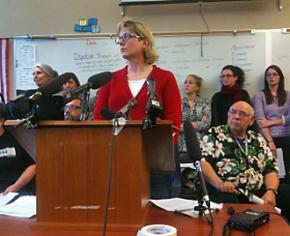Why we won’t give the MAP
On January 9, teachers at Garfield High School in Seattle announced their pledge to refuse to administer a standardized test that has faced widespread and persistent opposition throughout the Seattle Public Schools (SPS). The Measure of Academic Progress (MAP) test is supposed to chart student academic growth in math and language arts, but teachers--members of the Seattle Education Association (SEA)--are frustrated by the failure of the test to align with state standards they are supposed to teach to. And because MAP test results don't affect student grades or graduation, many students don't take the test seriously.
The teachers' public refusal to administer the test has struck a chord--across the city and the country--and support has been flooding in. Seattle school officials, however, responded by sending the teachers an intimidating letter. Here, we reprint the response by Garfield High teachers, sent on January 16.
Dear Superintendent Jose Banda,
Thank you for your communication outlining the Board's plan to review the effectiveness of MAP (Measure of Academic Progress) testing. As a staff, we are heartened to hear that the Board and the district have heeded the feedback provided them regarding both the questionable reliability and the limited usefulness of the MAP test.
We are also pleased to be invited to participate in the review process. Teachers, principals and other test administrators who have hands-on experience with MAP will be able to provide information that may not be available to those with less direct experience with the test.
While the district review of the test is a step in the right direction, we question why our past attempts to communicate with the district were ignored. Much was promised when the initial difficulties with the MAP were shared with the district, but those promises were not fulfilled. In addition, despite repeated attempts at communication by seriously concerned teachers, librarians and test administrators, the 2012-13 contract with NWEA was renewed at the June 20, 2012, board meeting with no discernible attempt on the part of the Board or the district to solicit the input that all stakeholders were anxious to share.

The upcoming review will be an opportunity to openly examine the evidence, but it is also quite late in coming. For three years, we have been administering the MAP, despite vocal and written concerns about many aspects of the test. We would ask that you understand our position in declining to administer the test given our original concerns about it, which have yet to be dealt with. They are as follows:
The test is bad for students on a number of levels. First, it reduces the class time available to prepare for course goals and assessments that determine placement, graduation and college admittance requirements. Those students who are most needy, specifically ELL and SPED students, lose more time from class. Second, the students are presented with test results that purport to provide them with a real assessment of where they stand in relation to their peers, but many of the students receive statistically insignificant scores based on a margin of error that exceeds expected growth.
In addition, many students self-report that they randomly select answers as they know the test results do not impact class standing or graduation. Finally, the testing process appropriates the computer labs in schools for a large part of the school year. This loss of resources disproportionally affects our lower income students who may not have home access to research or word-processing tools.
The test also negatively affects teachers. Because the results are unreliable, we are understandably reluctant to participate in gathering data that will be used for evaluation. When SPS and SEA agreed that the MAP would be used for evaluative purposes, less was known about the difficulty of basing teacher evaluations on the results. Perhaps neither organization was aware of NWEA's [Northwest Evaluation Association is the corporation behind the MAP test] own admonition that results were not to be used as a measure of teacher efficacy.
We welcome the opportunity to be a part of the dialogue about the MAP test in the upcoming review process, but at the same time, we would like the district to recognize our frustration with the lack of recognition of our expressed concerns and the expectation that we continue to administer a test that we deeply believe is bad for our students.
Given that the test and how the results are used is flawed on so many levels, we remain convinced that our only option is to not give this test. The interests of students, parents and teachers would all be better served by completing a thorough examination before the test is administered to students again, an examination which we believe will support our criticisms of the test.
Thank you for your consideration.
The staff of Garfield High School


